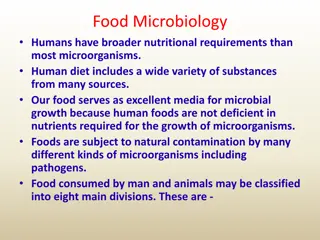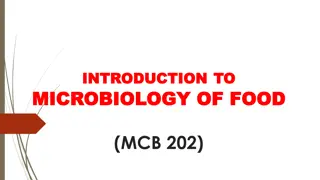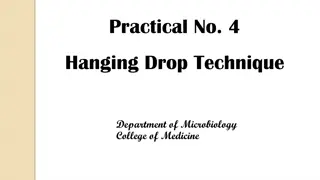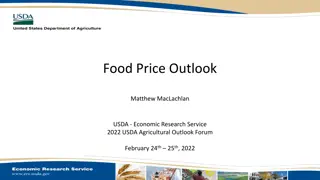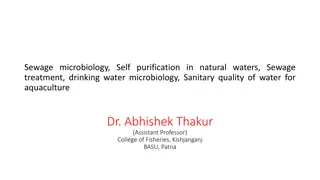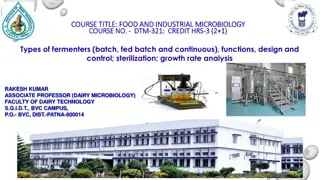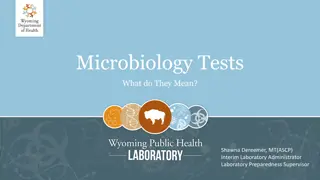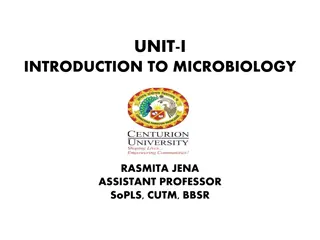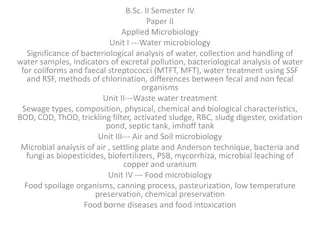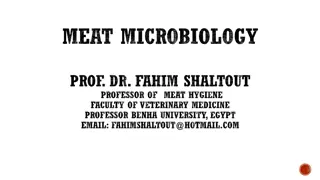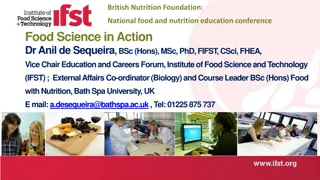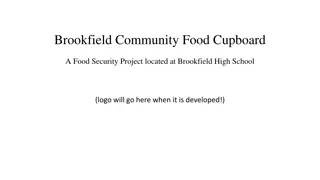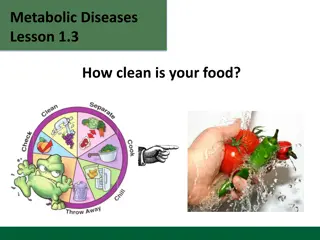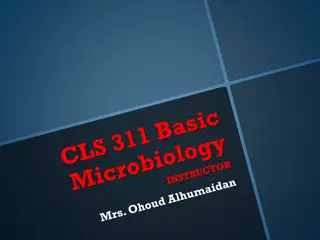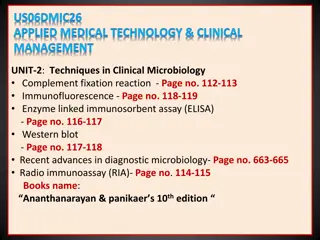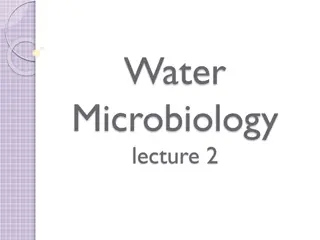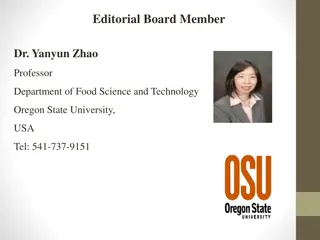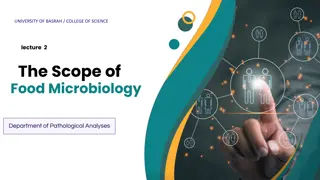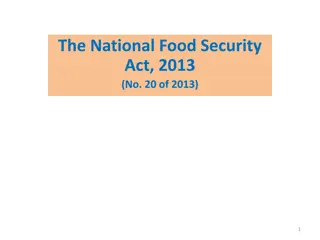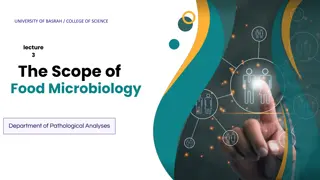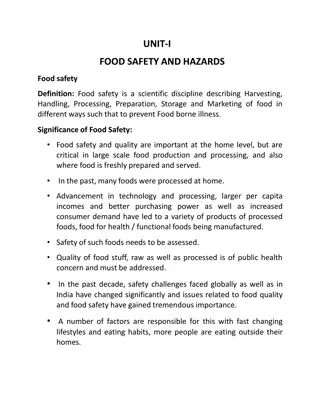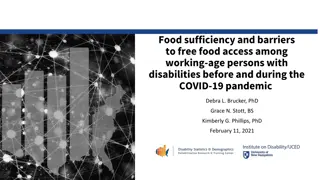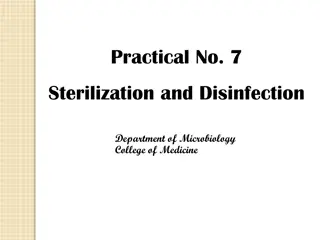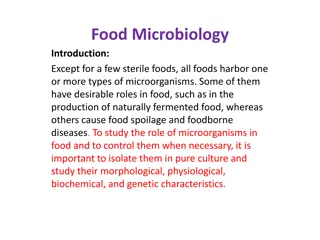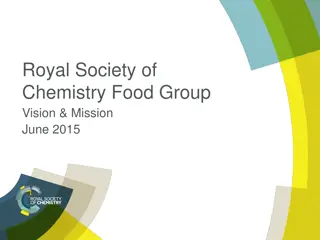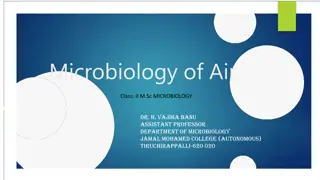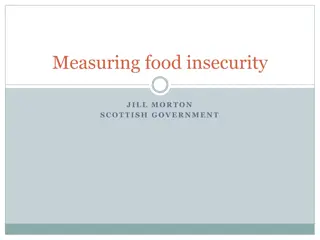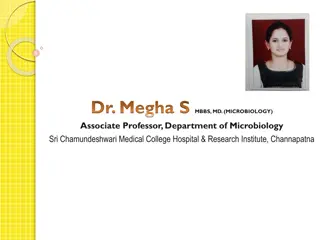BSc Food Science & Human Nutrition Programme Overview
This BSc Food Science & Human Nutrition programme at Maynooth University offers a comprehensive understanding of nutrition, biology, and chemistry as applied to food. With a focus on ingredients, production, products, and nutrition, students explore various aspects of food science including food saf
3 views • 12 slides
Role of Microorganisms in Food and Industry
Microorganisms play a crucial role in the food and industrial sectors, both benefiting and causing harm. They are involved in processes such as organic compound transformation, fermentation, and food production. While beneficial microorganisms contribute to the creation of various useful food produc
5 views • 44 slides
How are plant essential oils valuable as functional ingredients
Food Research Lab is one of the leading food industry consultants and offers various food production services. We provide food production and food manufacturing consultancy services to food, beverage and nutraceutical companies. Primary food production involves everything from food procurement, inve
8 views • 12 slides
Understanding Food Microbiology: Sources of Contamination
Humans have broader nutritional requirements than most microorganisms. The human diet includes a wide variety of substances, making our food excellent media for microbial growth. Natural contamination of food by various microorganisms, including pathogens, is common. Food consumed by humans and anim
0 views • 51 slides
Understanding Microbiology of Food and Foodborne Diseases
This introduction delves into the world of microbiology in relation to food, exploring key terms such as foodborne diseases, food hygiene, contamination, and more. It covers crucial concepts like toxic-infection, carriers, pathogens, and vectors, shedding light on the importance of food safety pract
1 views • 32 slides
Microbiology Study: Hanging Drop Technique in Department of Microbiology, College of Medicine
In the Department of Microbiology at the College of Medicine, the Hanging Drop Technique is utilized to study live microorganisms. This technique involves suspending microorganisms in fluid on a hollow ground slide, allowing for observation of their morphology under a microscope. By creating a wet m
0 views • 8 slides
Overview of Food Price Trends and Consumer Expenditures in the US
The presentation highlights the consumer spending on food, food price trends over time, 2021 food prices, and forecasts for 2022 in a historical context. It emphasizes that U.S. consumers spent 12% of their expenditures on food in 2020, aligning with historical averages. Food price inflation remaine
0 views • 21 slides
Understanding Sewage Microbiology, Water Treatment, and Quality Control in Natural Waters
Dr. Abhishek Thakur, an Assistant Professor specializing in sewage microbiology, self-purification in natural waters, sewage treatment, drinking water microbiology, and sanitary water quality for aquaculture, explains the processes involved in water treatment, sewage and wastewater treatment, primar
0 views • 18 slides
Understanding Fermentation and Bioreactors in Food and Industrial Microbiology
Fermentation is a crucial process where substances break down into simpler forms using organisms, generating energy. Bioreactors are systems supporting biochemically active environments for specific organisms, either aerobic or anaerobic. Learn about the history, importance, and applications of ferm
1 views • 16 slides
Understanding Microbiology Testing Methods and Results
Explore the various methods of microbiology testing, learn to interpret microbiological test results, and understand antibiotic susceptibility testing. Discover details on bacterial, viral, and parasitic infections through laboratory reports and supporting results like WBC counts and pathogen identi
0 views • 29 slides
Understanding Microbiology: An Introduction to the World of Microorganisms
Microbiology, the study of microorganisms, encompasses the history, branches, classification, and importance of microbes. From prokaryotes to eukaryotes, this field delves into the realm of tiny life forms invisible to the naked eye. Explore the rich history of microbiology, its branches, and the wi
2 views • 35 slides
Food Equipment Usage Guidelines for Safe Food Handling
Enhance your knowledge on using equipment for making food with proper safety procedures. Learn about essential points like wearing protective gear, checking hot food temperatures, food safety principles, and sanitization requirements. Understand machine settings, food temperature checks, and serving
1 views • 22 slides
Applied Microbiology in Water, Waste, Air, Soil, and Food
Exploring the significance of bacteriological analysis in water and wastewater, air and soil microbiology, and food microbiology. Topics include indicators of pollution, water treatment methods, wastewater treatment processes, microbial analysis techniques for air and soil, and food preservation tec
0 views • 14 slides
National Food Reserve Agency (NFRA): Enhancing Food Security in Nigeria
The National Food Reserve Agency (NFRA) under the Federal Ministry of Agriculture & Water Resources plays a crucial role in addressing agricultural production, storage, and marketing challenges in Nigeria. With a vision to ensure sustainable food access for all Nigerians and become a global food pro
1 views • 30 slides
Best Practices for Food Preparation to Ensure Food Safety
This chapter highlights essential practices for prepping food to prevent cross-contamination and time-temperature abuse in a food service setting. Topics covered include safe methods for thawing food, cooking temperatures, microwave cooking, informing consumers of risks, requirements for partially c
1 views • 25 slides
Understanding Meat Microbiology: Challenges and Growth Phases
Meat microbiology is a crucial aspect of food science, focusing on organisms present in red meat, poultry, fish, and their products. This field addresses both preventing food spoilage and protecting consumers against foodborne illnesses. Challenges arise from slaughtering to home consumption, where
0 views • 124 slides
Exploring Food Science and Technology in Modern Society
Delve into the world of food science and technology with insights on what scientists do, the importance of understanding food, definitions of food science and food technology, factors affecting food spoilage, and traditional and modern food processing technologies. Gain knowledge on testing hypothes
0 views • 22 slides
Food Safety Practices in Service Industry
This chapter focuses on the essential food safety practices in the service industry, covering topics such as time and temperature requirements for holding food, ways to prevent time-temperature abuse and cross-contamination, minimizing bare-hand contact with food, preventing staff and customers from
0 views • 26 slides
Understanding Microbiology Lab Results: Case Study of Mrs. Septic's Infection
In this case study, Mrs. Septic's blood cultures are growing gram-positive cocci, leading to a differential diagnosis involving various bacterial pathogens. Through a series of microbiology lab findings, the causative organism, Staphylococcus aureus, is identified. Further complications arise, indic
0 views • 73 slides
Brookfield Community Food Cupboard: Addressing Food Insecurity at Brookfield High School
Brookfield Community Food Cupboard is a project aiming to provide food security to individuals and families in the Riverside Park/Hunt Club area, including students and families served by Brookfield High School. The initiative seeks to supplement existing food security programs by offering a day's w
0 views • 11 slides
Food Safety and Preventing Food-borne Illness
This lesson focuses on the importance of food safety, addressing how clean our food is and at what points safety can be compromised. It delves into common types of microbes that contaminate foods and explores ways in which food safety can be compromised. The activity involves case studies on food sa
0 views • 11 slides
The Significance of Microbiology in Health Sciences and Beyond
Microbiology plays a crucial role in understanding small living organisms, including pathogens and non-pathogens. Studying microbiology is essential due to the prevalence of microorganisms in our body, their role in the food chain, and their applications in various industries like food, beverage, an
0 views • 19 slides
Mastering Good Food Hygiene and Storage Practices
Understanding food spoilage causes, common food-poisoning bacteria, conditions for bacterial growth, ways to prevent food contamination, safe food handling practices, HACCP concept, types of perishable foods, importance of proper food storage, packaging materials for food, and recognizing signs of f
1 views • 27 slides
Clinical Microbiology Techniques: Complement Fixation Test (CFT) in Diagnostic Practice
Complement Fixation Test (CFT) is a key technique in clinical microbiology, utilizing antigen-antibody complexes to fix complement for various immunological reactions. The test involves multiple steps and reagents, with guinea pig serum for complement activation. Standardization is crucial for accur
0 views • 46 slides
Understanding Water Microbiology: Marine and Fresh Environments
Exploring water microbiology, this lecture delves into the unique ecosystems of the marine and freshwater environments. From the high-pressure, low-temperature marine environment supporting various bacterial adaptations to the nutrient-rich lakes and rivers, the role of microbial processes and organ
0 views • 20 slides
Understanding Kitchen Hygiene and Food Safety
Kitchen hygiene and food safety are crucial to prevent food spoilage and food poisoning. Factors like enzymes, micro-organisms, and oxygen can lead to food spoilage, while food poisoning occurs when pathogenic bacteria multiply in consumed food. Practicing proper hygiene, storage, and preparation me
0 views • 27 slides
Dr. Yanyun Zhao - Food Science & Technology Professor at Oregon State University
Dr. Yanyun Zhao is a prominent Professor at Oregon State University specializing in food science and technology. With a strong research focus on food processing technologies and food safety, Dr. Zhao has made significant contributions to the field. Her expertise in value-added food processing, antim
0 views • 16 slides
Exploring the Fascinating World of Food Microbiology and Microbial Habitats
Delve into the intriguing realm of food microbiology, uncovering how fermentation microbes can positively influence food properties, the importance of microbiological quality assurance, and the diverse habitats where microorganisms thrive. Learn about the impact of microflora on food quality and saf
0 views • 7 slides
National Food Security Act, 2013 Overview
The National Food Security Act, 2013 (NFSA) aims to ensure food and nutritional security for all by providing access to adequate quality food at affordable prices. It includes provisions for hot cooked meals, food security allowance, social audit, nutritional support for children, and various monito
0 views • 15 slides
Insights into Airborne Microorganisms and Fungi: Implications for Food Safety
Airborne microorganisms and fungi play crucial roles in food microbiology, with various species surviving in the atmosphere despite hostile conditions. Bacteria like Bacillus and Streptomyces disperse through air turbulence, while fungi such as Penicillium and Aspergillus produce spores resistant to
0 views • 9 slides
Importance of Food Safety in Modern Food Production
Food safety is crucial in modern food production to prevent foodborne illnesses. With advancements in technology and increased demand for processed foods, the need to ensure the safety and quality of food has become paramount. Factors affecting food safety include poor hygiene practices, contaminate
0 views • 30 slides
Understanding Food Justice and Insecurity: A Comprehensive Overview
Food Justice Primer provides insightful definitions and discussions on key concepts such as food justice, food insecurity, food sovereignty, and food deserts. It highlights the need for equitable sharing of benefits and risks in the food system, aiming to transform current disparities and inequities
0 views • 49 slides
Food Sufficiency and Barriers to Free Food Access Among Working-Age Persons with Disabilities Before and During COVID-19 Pandemic
Working-age persons with disabilities face economic vulnerability and higher chances of living in food-insecure households. This study explores food sufficiency and barriers to accessing free food during the COVID-19 pandemic. Data was collected through an online survey, revealing insights into food
1 views • 14 slides
Sterilization and Disinfection Methods in Microbiology
Sterilization and disinfection are crucial processes in microbiology to eliminate all microorganisms and prevent their spread. Methods such as heat, ethylene oxide gas, and filtration are employed to achieve sterilization. Physical agents like heat through dry heat, flaming, and hot air ovens, as we
0 views • 27 slides
Exploring the World of Food Microbiology
The field of food microbiology delves into the intricate relationship between microorganisms and food, covering aspects such as fermentation, spoilage, and probiotics. Discoveries by pioneers like Pasteur paved the way for understanding the roles of microorganisms in food production and preservation
0 views • 21 slides
Royal Society of Chemistry Food Group Vision & Mission Summary
The Royal Society of Chemistry Food Group aims to lead, promote, and disseminate the understanding and importance of chemistry in food. Their vision is to enhance food and nutrition security through advancing the chemistry of food ingredients. They strive to engage with various communities to promot
0 views • 4 slides
Importance of Aero-Microbiology in Understanding Airborne Diseases
Aero-microbiology focuses on studying living microbes suspended in the air, with a particular emphasis on sources of microorganisms in the atmosphere. Airborne transmission of diseases through droplets and infectious dust is explored, highlighting the risks and factors affecting pathogenic microorga
1 views • 22 slides
Understanding Food Insecurity Measurement in Scotland
The report emphasizes the importance of understanding and addressing food insecurity effectively in Scotland. It discusses the dignity in ending hunger, the rights to nutritious food, and the limitations of emergency food aid. The Food Insecurity Experience Scale is highlighted as a tool for measuri
0 views • 7 slides
Dr. Megha S, MD (Microbiology) - Associate Professor in Microbiology
Dr. Megha S is an MBBS, MD (Microbiology) professional with 10 years of experience, currently serving as an Associate Professor at Sri Chamundeshwari Medical College Hospital & Research Institute. She holds memberships in relevant professional bodies and has a significant research publication record
0 views • 9 slides
Understanding Food Costing and Pricing in the Food Industry
Explore the factors influencing food costs in the restaurant industry, including the importance of food cost percentage, pricing strategies, and impact of location on food prices. Learn about managing food costs, controlling waste, and optimizing profitability through effective cost analysis and men
0 views • 12 slides



